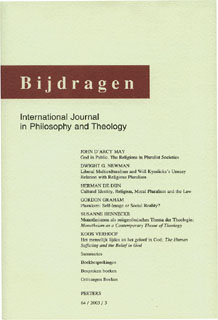 previous article in this issue previous article in this issue | next article in this issue  |

|
Document Details : Title: Op zoek naar een waarheid die verplicht Subtitle: In Search of a Truth that Obliges Author(s): JONKERS, Peter Journal: Bijdragen Volume: 58 Issue: 2 Date: 1997 Pages: 194-205 DOI: 10.2143/BIJ.58.2.2002398 Abstract : In this paper I want to query Lieven Boeve's postmodern notion of truth as deficiency and radical plurality. In order to do so, I depart from a general analysis of truth and its ethical implications, especially with regard to the relation between universality and particularity. By stressing the practical dimension of truth, it becomes possible to overcome the dominant opposition between the universal truth of positive science and the particularity of opinions and beliefs within (religious) traditions. In this way, the question of the specific truth of traditions and its relation to other dimensions of truth can be approached from a new perspective. First of all we are obliged to truth in the sense that all our thinking and speaking necessarily has a truth-presumption. As a thinking being man participates in an order of truth. This presupposes that he is implicitly familiar with it, that truth is to some extent interior in man. But on the other hand, this familiarity can never lead to a complete assimilation of truth by thinking. Truth is never completely present and manifest for thinking, but has an undeniable aspect of exteriority. Thus, the fact that man is obliged to truth implies a peculiar entanglement of interiority and exteriority with regard to truth. Another element in this obligation to truth is universality. Man can never be the ultimate warrant of the truth of his thinking. If truth-claims have any sense, they must refer to a universality which lies beyond the particularity of individual situations and traditions. From this perspective, a radical imputation of any universality, related to a similarly radical plea for the plurality and particularity of truth poses insurmountable problems, because it is inadequate to our experience of truth, and to the way in which truth functions in human thinking and speaking. This implies the necessity of a metaphysical analysis of truth, which focuses on the transcendental aspects of our obligation to truth. But there is also a second dimension in the relation between truth and obligation. Since man is a corporal being, his thinking is characterised by his spatio-temporal situation. This implies that truth only shows itself as a plurality and particularity of insights, within the giveness of concrete situations, e.g. religious traditions; it is bound to life in its concreteness. In this context another aspect of the ethical dimension of truth appears: truth is not only a theoretical matter, but is also related to faithfulness, to true life. The world we live in, with its socio-economical and cultural structures, traditions etc. has a specific truth, in spite of its manifest contingency and irrationality. From this perspective truth is what makes life liveable, and thus it is related to the good life. This implies again that truth has a normative function with regard to life in its concreteness. Thus particularity and plurality are integrated into our conception of truth. This entanglement of the universality and particularity, unity and plurality of truth remains a paradox for our thinking, but it is not necassarily a dichotomy. In order to think this paradox adequately a 'rigid metaphysics' is necessary. On the one hand this metaphysical thinking is rooted in the life-world and analyses its truth, characterised by plurality and particularity. But on the other hand this thinking has to relate the particular truth of the lived life with other possibilities and experiences of thinking. Thus it discovers its openness for universal truth as a regulative idea, that orientates our thinking about the truth of the life-world and its traditions, and can serve as its standard. On the base of this analysis I query Boeve's position on two points. Firstly, I wonder whether his conception of truth as a 'relationship to an incompletable deficiency' and as radical plurality is not deficient itself with regard to truth. It is evident that universal truth always manifests itself to human thinking in the mode of particularity and plurality (cfr. above). But as a regulative idea it orientates our thinking and helps us to overcome the deadlock of radical plurality. Some substantial qualification of truth is necessary, and in my view Boeve's notion of truth as a deficiency cannot serve such a purpose. Secondly, I wonder whether Boeve's notion of truth as radical plurality enables him to maintain his claim that thinking has a 'relationship' with truth. Does the postmodern concept of plurality not imply an incommensurability, that excludes any relationship? |
